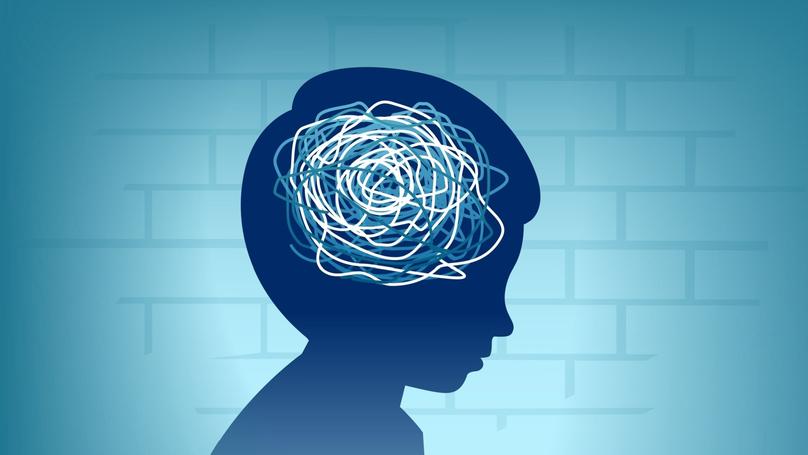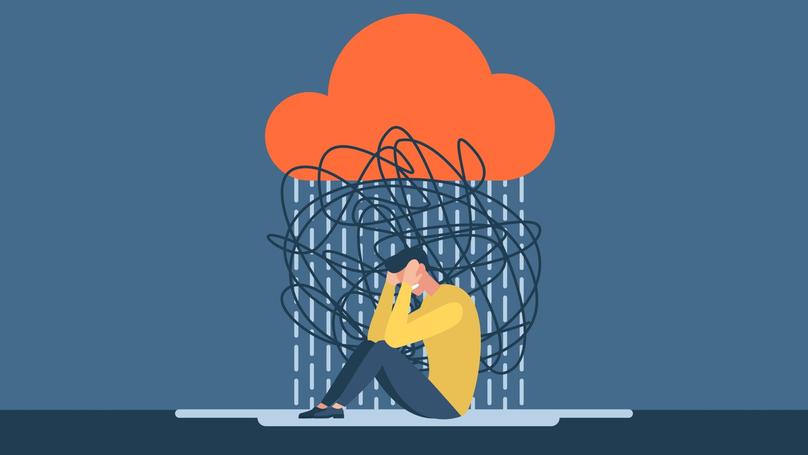Get over it: how to work through psychological trauma and stress by yourself
Pain, loss, and trauma are something that all of us face at one time or another.

It is an inevitable part of the human experience that can occur in personal life and the workplace. After all, what isn't considered a trauma? Whether it's being fired, causing a big scandal in your favourite workplace, or enduring outright insults from a client who oversteps your boundaries. Many negative situations can lead to psychological trauma and post-traumatic stress disorder. Contrary to misconceptions, the latter also occurs among war veterans and law enforcement officers. Post-Traumatic Stress Disorder (PTSD) is a condition marked by intense anxiety and chronic feelings of fear that persist or recur even after the traumatic event has concluded.
In this article, we will talk about how psychological trauma occurs in your personal life and at work, how to know if your mind needs more help to cope with difficult events and, most importantly, how you can work through negative situations on your own to survive them and forget about them forever.
Why psychological trauma and stress occur

To effectively manage post-traumatic stress disorder (PTSD), trauma, or any form of stress, it is crucial to gain insight into the underlying causes. As you're likely aware, these conditions are typically precipitated by distressing, dangerous, or shocking events. There are times when you don't even realise that this event occurred and that it will eventually affect you greatly. At that crucial moment, a complex combination of hormones, including cortisol and adrenaline, floods the bloodstream, designed to mobilise all the body's forces to protect it. Typically, once the scary situation subsides, the concentration of hormones gradually decreases, allowing the body to "reboot" and return to its normal mode. However, this, unfortunately, does not always happen and therein lies the primary reason why psychological trauma occurs.
For instance, when unpleasant situations recur frequently, the body may find it more convenient to sustain a continuous concentration of cortisol and adrenaline rather than expending them in intermittent bursts. Simply put, the consistent recurrence of traumatic events or prolonged, intense stress ingrains a perpetual state of alertness within the body. That's why if your job, although you love it, makes you feel stressed 24/7, sooner or later, you will wake up with a feeling of anxiety, even at weekends. All of this can be considered a form of post-traumatic stress.
However, it is important to clarify here that not all individuals who experience a traumatic event will likely develop PTSD or anxiety. Likewise, It's important to recognise that experiencing something out of the ordinary, terrifying, or extraordinary isn't a prerequisite for PTSD to occur. PTSD can also be caused by prolonged exposure to moderately stressful situations rather than extremely stressful situations. The duration of these situations and the unique individual characteristics play a pivotal role. Psychological flexibility and adaptability significantly influence how events impact us. Notably, fears and negative attitudes often take root during childhood when the psyche is particularly malleable.
As Professor Daniel Siegel from the University of California suggests, everyone possesses a unique "window of tolerance." This "window of tolerance" represents the optimal physiological stress and tension level an individual can withstand. When events align with our "window of tolerance," meaning they fall within acceptable values, our psyche can process them without significant difficulties. When an event exceeds the boundaries of our existing "window of tolerance," it metaphorically "breaks the "window sill" because these events cannot be grasped without resulting in some form of emotional or psychological impact. It is also known that powerful experiences impact the nervous system and the brain's structure and function. Studies in both humans and animals have found that severe trauma causes a decrease in the volume of the hippocampus and that people with a history of psychological trauma have a smaller-than-normal amygdala. However, the amygdala is the centre of cognitive and emotional processing. At the same time, the hippocampus is the "learning centre" - responsible for accumulating experience and memory. Therefore, the emergence of psychological trauma is inherently influenced by biological factors, and it is not the individual's fault.
Signs that trauma or stress are not being managed properly

Although trauma arises from various situations and can have completely different origins and types, post-traumatic stress always has common symptoms. So, you might discover that you still carry trauma from your experience or suffer from post-traumatic stress due to the following signs:
-
You constantly review what you experienced and strive to rethink it. However, this becomes obsessive in nature and can even evolve into a kind of "ritual." For instance, you might find it difficult to focus on work and complete tasks because you keep replaying the same scene in your mind, or recurring nightmares haunt you.
-
You avoid situations you associate with past experiences or possess similar content/conditions. For example, you can refuse to visit places where the trauma has occurred or interact with someone who invokes memories of the experience.
-
You undergo heightened activity and autonomous arousal. For example, you don't want to eat. Still, you are very active and mobile at work, do a lot of errands, and literally "sparkle" with energy. However, simultaneously, the nervous system becomes depleted, leading to an unhealthy state that exacerbates both physical and mental well-being while you rest. Comparable symptoms manifest alongside mood swings, impulsivity, and tearfulness.
-
You experience the physical sensations of anxiety even when there are no frightening factors. As an illustration, during an ordinary day, you may struggle to breathe, experience a racing heart, feel dizzy, and notice sweaty palms. The triggers for this physiological response may not be immediately apparent or identifiable.
-
You experience stagnation, apathy, and a lack of motivation to grow, contrasting your previous behaviour. Previously, you actively sought out new perspectives and challenges. However, now you find yourself confined to a monotonous routine, lacking creative ideas and motivation. Additionally, you grapple with feelings of helplessness and even physical weakness.
The physical manifestations of trauma and stress include:
-
Restless sleep, prolonged periods of wakefulness, or even complete lack of sleep.
-
Nervous tics, including uncontrollable ones (eye twitching, tremors).
-
Prolonged daydream episodes, such as "getting stuck" on a single issue, procrastination.
-
The desire to escape reality through prolonged sleep, alcohol, food, and drugs.
-
The sudden onset of health problems, such as gastrointestinal problems, eczema, skin diseases, and headaches.
-
A sharp decrease in immunity, frequent colds (More than once every six months).
If you notice several of these symptoms, the first step is determining when they started appearing. These symptoms do not always manifest immediately after experiencing trauma; they may emerge a week or even a month later. Furthermore, the symptoms of post-traumatic stress do not necessarily imply that the stress response is inappropriate. While their presence is a natural reaction, it becomes concerning if they persist for more than 3-4 weeks and significantly impact your quality of life. Therefore, it is essential to monitor the duration of persistent PTSD symptoms before drawing any conclusions. If their manifestations gradually subside over time, It's vital to wait until the symptoms completely subside and provide your body with optimal conditions for recovery. These circumstances largely align with what you need to do for yourself, even if PTSD has developed into a disorder and necessitates assistance.
Conscious experience of trauma and stress: effective techniques and methods

Psychotherapists and experts unanimously believe that the main way to cope with trauma or stress is to approach it with mindfulness. What is meant by mindfulness? This refers to the ability to observe, monitor, and document your present situation without getting entangled in the past or future. For instance, it involves recognising and labelling the emotions you encounter over a specific time frame. This refers to fully engaging with life rather than dismissing it and attempting to divert attention. Today, mindfulness has become a popular trend. For instance, conscious food consumption involves putting away all gadgets, dining in silence, savouring every bite, chewing slowly, and fully engaging in physical actions, emotions and thoughts. The same applies to traumatic events. Suppose you develop a high level of awareness. In that case, you will no longer experience acute PTSD because you will be able to properly experience negative emotions right away, exactly as these events occur.
For recovery and stress management, provide yourself with a calm setting.
In the previous section, we discussed the importance of prioritising comfort, especially after experiencing a traumatic event. Even if you're uncertain about potential post-traumatic stress. Our psyche always processes the experience of an unpleasant situation according to one neurobiological scheme. Therefore, when experiencing stress, there are three culminating points when stress reaches its peak:
-
The 5th day after the trauma.
-
The 12th day.
-
The 21st day.
The intensity of PTSD and its presence vary largely depending on how you navigate and experience these three points. Suppose you find all three points challenging, and your mental state is affected. In that case, stress may persist and become chronic rather than diminishing. During the three weeks following a difficult event, taking care of yourself is important as your nervous system continues to process the experience.
Please note that mindfulness may temporarily worsen traumatic stress symptoms if you have never practised mindfulness before and are working through stress-related trauma for the first time. Therefore, mindfulness makes us pay attention to ourselves and observe the body's reactions and the feelings that arise. If you consistently engage in avoidance behaviours, it can exacerbate anxiety and lead to more pronounced physical symptoms. So, use mindfulness and all the techniques below with caution, take time out if needed, or reach out to a therapist or trusted person to try the methods together.
- Sleep for 8-9 hours daily. Going to bed before 11 p.m. is beneficial because it allows our brain to absorb information more effectively, including details related to any trauma we may have experienced.
- An effective working day is about 8 hours. It would help if you did not take days off or breaks or allow yourself to stay in bed and not leave the house. It is important to maintain your daily routine, both physical and mental, and not reduce it or increase it.
- Rest during the day and take regular breaks. You must spend at least 2 hours a day alone with yourself, doing something pleasant, such as a hobby.
- Three meals a day in compliance with the norms and calories recommended by doctors, depending on your age, weight, and health status. This emphasises the importance of maintaining a balanced and nutritious diet. It's essential to enjoy a variety of foods without excessive indulgence. Add saturated fats and tryptophan to your diet (the latter are converted into serotonin). They can be found in cheese, dried fruits, and chocolate with a high cocoa content. Dairy products and citrus fruits are also beneficial because they reduce cortisol levels in the blood.
- Drink clean water every hour or two per day. The optimal amount of water varies individually, but it's crucial to maintain regular hydration and avoid feeling thirsty (thirst is a sign of dehydration). Ensure information hygiene for yourself, which means minimising the intake of irrelevant information. Limit your use of social media and read the news. Minimising additional stressors that can exacerbate the situation during stressful periods is crucial. This includes avoiding disturbing posts on Facebook and limiting interactions with unpleasant or anxious acquaintances.
Minimise the impact of trauma and enhance your resilience in dealing with it.
Here is a cognitive psychotherapy technique where you can do two things:
- Reduce the importance of the experienced event, problem, situation, etc. Everyone has their hierarchy of life values and priorities; sometimes, this causes cognitive distortions and, as a result, stress. For instance, your professional authority is of utmost importance to you. In light of a high-profile dismissal, you perceive that it has been compromised. Is that the case? Or has your authority survived, and you are only exaggerating the consequences of being fired, even though you have already found a new job? Is that even really that significant for you? Why? Is it possible to give it less attention?
- Increasing your ability to cope with the situation. When faced with stress, individuals often downplay their achievements and skills due to fear, resulting in helplessness. You may believe that you will never "remove yourself" from that situation, that you will never cope with anything, and now it will haunt you for the rest of your life. However, what is the real evidence for this? Have you had similar situations in the past? What about your friends? How would they deal with this? Why do you believe that you are weaker or worse than them? Are there any double standards here when you consider a friend "worried about nothing" but showing extreme harshness towards yourself?
Lectera’s Online Courses by topic
Relive the traumatic event again, but do it properly.
One might say this is a method for the brave, but it is the most effective. Recall the profoundly distressing incident with meticulous precision: your emotions, actions, the physical sensations coursing through your body, thoughts at that moment, and the behaviour of those around you or other participants. Prepare yourself for heightened anxiety. Following that, grab a notepad and pen and compose an essay or letter regarding the situation using the following phrases:
-
The following situation occurred...
-
I expected that...
-
In fact, it turned out that...
-
For this reason, I had to...
-
The worst thing about this is...
-
I now feel these emotions...
-
I'm very sorry that...
-
It seems to me that I could do the following...
-
However, I understand that I could not do anything else because...
-
Now I know that...
Subsequently, scrutinise your written account and endeavour to address the ensuing questions in writing (it would also be beneficial to articulate the answers aloud):
-
What aided you in enduring that harrowing experience? Were there specific qualities, skills, or individuals around you?
-
What helped you at that time and after? What "pillars of strength" do you have now?
-
What resources, knowledge, or opportunities did that event open up for you? How can you view it from an alternative, more constructive perspective?
-
What words of wisdom would you offer to someone who has undergone a comparable experience? What guidance would you give them?
-
What can you do and know now that you couldn't and didn't realise then? How do you compare yourself now to what you were like in the past? How can this help you in the future if this situation arises again?
Create a new positive experience
In contrast to popular belief, it is not our thoughts that determine our behaviour; on the contrary, behaviour predetermines thoughts. So, if you change your behaviour pattern, your attitude will soon change. Although you might experience psychological resistance, overcoming it will yield results sooner than you think. Create a situation that bears some resemblance to the one that caused your post-traumatic stress, and then transform it to your advantage. You have the power to recognise that each similar situation doesn't necessarily lead to the same outcome. You can choose to behave differently and take control. For instance, consider a situation where you were reprimanded due to a poorly completed project. Embark on a new project, following a similar path but armed with the latest tools, vision, and approaches. When you receive a bonus for this new project, it will replace the old experience with a positive one.
Keep a diary of your feelings
Furthermore, this practice should be ongoing, ideally daily, even after post-traumatic stress has subsided. Working with a diary is a straightforward process. Each evening, take a moment to jot down the most powerful and intense emotions you experienced during the day. Additionally, record any events that directly preceded or caused these emotions. You can organise this information into a table format if it's more convenient.
Write down your feelings like this:
-
The Specific name of the emotion (it is very important to identify it clearly).
-
Its physical manifestations
-
Which thoughts accompany it?
-
What caused this feeling based on your assumptions?
-
How long did this feeling last?
-
How have your feelings changed over time?
-
At what precise moment and in what context did it vanish?
Whether you observed anything significant or strange associated with a particular emotion (for example, that it suddenly transformed into joy or that you actually caused it on purpose when you began to replay those moments in your head).
There are also mobile apps that help you track your emotional state and record your daily feelings, such as Mind Tracker or Daylio.
How do you determine if the techniques are effective and that post-traumatic stress is fading safely? First, the intensity and frequency of your symptoms decrease. This might not be a sharp decline but a slow and gradual one, with a difference noticeable in only a few weeks or more. Secondly, you experience relief after applying the technique and following the recommendations. Thirdly, new events, people, or values that are not tied to past negative experiences emerge in your life. The key to maintaining and enhancing mental health is always self-care, including attending to your physical needs. "But do not be afraid and do not hesitate to contact a psychotherapist if your efforts are not enough to cope with the trauma - nothing can replace qualified professional help!
Share this with your friends via:
Latest News

A significant stage in the development of the alternative education system has begun in West Northamptonshire in the UK: the County Council is actively calling on parents, guardians, and trustees to participate in shaping the future of this key area.

Outwoods Primary School in Atherstone, Warwickshire, having experienced deep sadness after the loss of their famous cat, Silla, has found solace in a new pet – a Maine Coon named Aloysius O’Hara.

In modern universities, artificial intelligence, and in particular ChatGPT, is rapidly transforming from a controversial tool into a full-fledged student assistant.

An innovative educational project is gaining momentum in UK primary schools, aiming to change attitudes towards video games.

The Massachusetts Institute of Technology (MIT) presents MIT Learn – a revolutionary online platform that opens a “new front door” to access university knowledge and resources.












 “I’m Here for the Long Haul”: When Loyalty to a Company Becomes Toxic
“I’m Here for the Long Haul”: When Loyalty to a Company Becomes Toxic
 Freelancing, Remote Work, Office Jobs, or Consulting: How to Choose the Work Format That’s Right for You
Freelancing, Remote Work, Office Jobs, or Consulting: How to Choose the Work Format That’s Right for You
 Test: How Prone Are You to Abusive Behavior as a Manager?
Test: How Prone Are You to Abusive Behavior as a Manager?
 Test. What superpower would you possess if you were a superhero?
Test. What superpower would you possess if you were a superhero?
 Test. What Should You Let Go of Before Winter Ends?
Test. What Should You Let Go of Before Winter Ends?
 Test. Which Ritual Should You Start Practicing This Winter?
Test. Which Ritual Should You Start Practicing This Winter?
